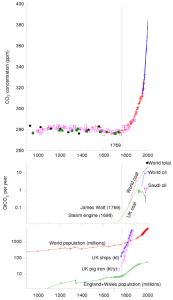 The graph you see is from “Sustainable Energy — Without the Hot Air” by Dr. David JC MacKay. His entire book may be found at: http://www.withouthotair.com/ He also has a talk on line at TED Talks, which is a good introductory place to start. Click on the graph to see a larger version. Look at it carefully. The point of this graph is that the invention of the steam engine by James Watt allowed large scale coal production by the UK and consumption of coal for energy production took off. This powered the Industrial Revolution and changed the world. Coal consumption has been followed by oil consumption. Our current rate of growth of oil consumption is projected to parallel the growth rate (and precipitous decline) of coal production in the UK. There are two issues here. One is the consumption of a finite supply. The other is the climate impact of our use of fossil fuels to power our life style, as global population rises.
The graph you see is from “Sustainable Energy — Without the Hot Air” by Dr. David JC MacKay. His entire book may be found at: http://www.withouthotair.com/ He also has a talk on line at TED Talks, which is a good introductory place to start. Click on the graph to see a larger version. Look at it carefully. The point of this graph is that the invention of the steam engine by James Watt allowed large scale coal production by the UK and consumption of coal for energy production took off. This powered the Industrial Revolution and changed the world. Coal consumption has been followed by oil consumption. Our current rate of growth of oil consumption is projected to parallel the growth rate (and precipitous decline) of coal production in the UK. There are two issues here. One is the consumption of a finite supply. The other is the climate impact of our use of fossil fuels to power our life style, as global population rises.
CO2 production is rising at a logarithmic rate. Climate is also changing. One can argue whether the culprit is all or even mostly CO2. Methane and other man-made greenhouse gases may be bigger problems. Regardless, the growth rate in CO2 we see is not sustainable; not if we want to keep life going on this planet.
Logarithmic growth of population is not sustainable. Logarithmic increase in water consumption is is not sustainable. We are already running out of water. The mountain ice caps are disappearing at an accelerating rate. Last year, for the first time in recorded history, it was possible to sail a boat from Greenland to Alaska by the “Northern Passage”, or open water north of Canada. The Arctic ice cap has shrunk enough that a team actually sailed all the way from Greenland to Nome, Alaska.
We can’t keep doing what we have been doing and expect there to be no consequences. I read somewhere that one definition of insanity is to continue doing the same thing and to expect different results. What we are doing about the problem is not working.
Logarithmic growth is not sustainable. Something will change. It might be manageable. It is likely to be catastrophic, if we don’t do something more intelligent, and more sustainable, soon.